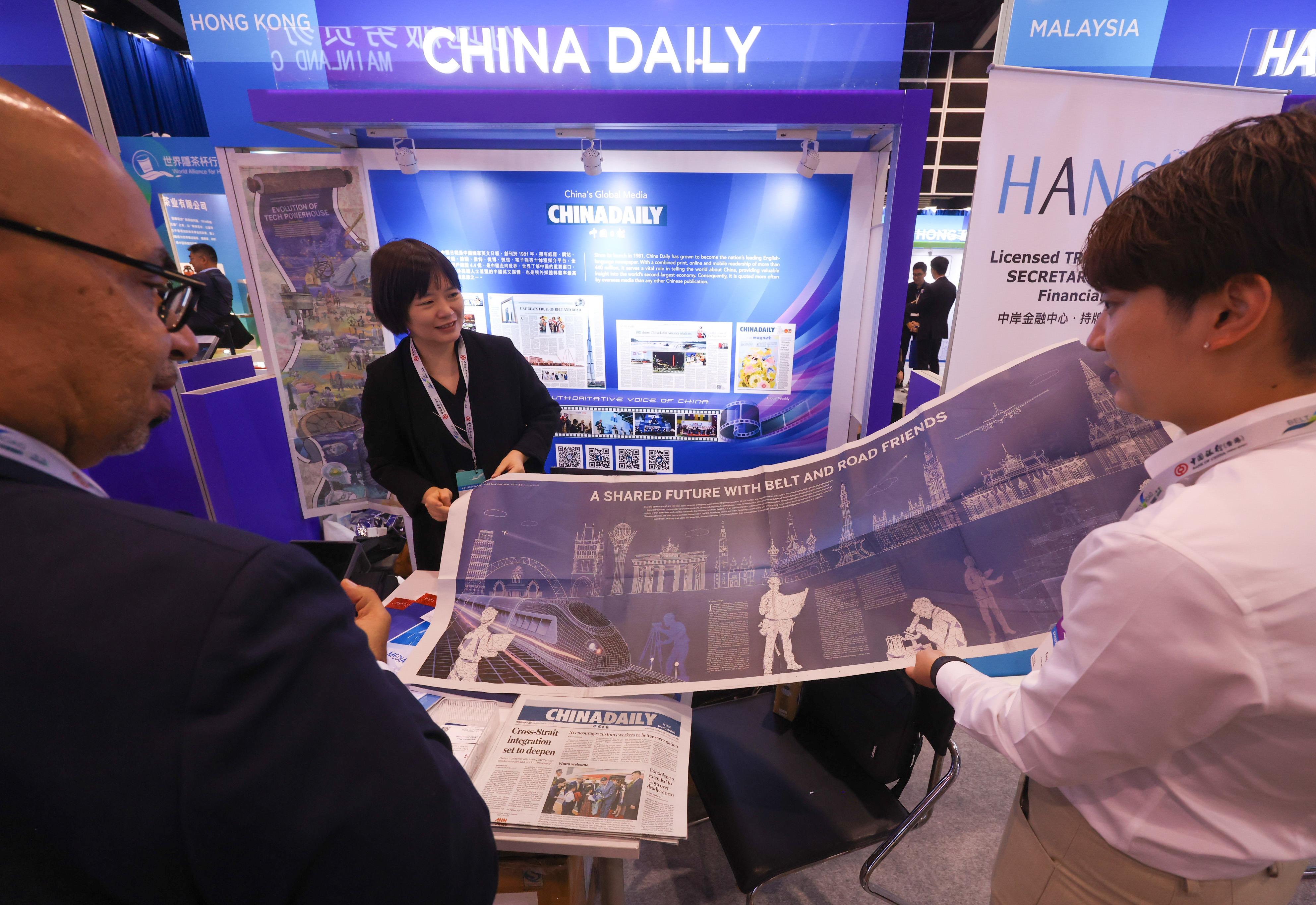China-led program helped boost connectivity and benefits for nations around globe, forum told
 Staff members of China Daily introduce a special edition of the newspaper to visitors at a booth during the Belt and Road Summit 2023, in Hong Kong on Sept 13. (CALVIN NG / CHINA DAILY)
Staff members of China Daily introduce a special edition of the newspaper to visitors at a booth during the Belt and Road Summit 2023, in Hong Kong on Sept 13. (CALVIN NG / CHINA DAILY)
Officials from countries involved in the China-led Belt and Road Initiative (BRI) outlined the importance of further enhancing cooperation under the program’s framework for greater connectivity and mutual benefits, making the remarks during a two-day forum that opened in Hong Kong on Sept 13.
The 8th Belt and Road Summit, jointly organized by the Hong Kong Special Administrative Region (HKSAR) government and the Hong Kong Trade Development Council, commemorated the 10th anniversary of the BRI which was unveiled by Chinese President Xi Jinping in 2013. Nearly 6,000 people from around the world registered for the event that bore the theme “Prospering on a Decade of Collaboration”.
Vice-Premier Ding Xuexiang, in a pre-recorded opening keynote speech, said he hopes that Hong Kong will deepen regional cooperation and expand its economic and trade network, improve financial services and financing channels and strengthen global offshore RMB business, focus on professional services to tap the potential of talents, and deepen people-to-people and cultural exchanges to become a cultural melting pot.
Hong Kong is determined to embrace the vast promise of the Belt and Road, and redouble efforts to serve as the Belt and Road’s functional platform, HKSAR Chief Executive John Lee Ka-chiu said in his opening remarks.
Secretary-General of the 10-member Association of Southeast Asian Nations Kao Kim Hourn said he values Hong Kong’s role in linking China with ASEAN and the rest of the world particularly under the BRI.
Highlighting the 10th anniversary of the BRI, Kao raised five points for people-centered, high-quality and sustainable growth going forward.
First, connectivity services are vital not only to facilitate the flow of goods and services among partners, but also for broader trade, investment, education, tourism and related exchanges that will promote greater prosperity for all people in the region.
Second, infrastructure progress will be critical to support ongoing social and economic development.
Third, infrastructure financing remains a major challenge as it means not only funding projects, but also providing means that are affordable, inclusive and environmentally sustainable, Kao said, adding that he encourages public and private partnerships.
Fourth, promoting smart cities and sustainable organizations drives long-term growth and contributes to the greatest social and economic outcomes.
Fifth, “our region is only as strong as our peoples”, Kao said, noting that youth especially have high prospects for people-to-people cooperation.
Kao said he welcomes Hong Kong’s bid to join the Regional Comprehensive Economic Partnership (RCEP) trade agreement.
President Xi mentioned the Silk Road Economic Belt first in Kazakhstan in September 2013, and the 21st Century Maritime Silk Road a month later in Indonesia. Once called One Belt One Road, they are now collectively known as the Belt and Road Initiative.
Minister of Trade and Integration of Kazakhstan Arman Shakkaliyev told the Hong Kong forum that his country, the first to join the BRI, aims to become a transport hub in Eurasia, linking the continents.
Indonesia’s Special Staff to Coordinating Minister for Economic Affairs Rizal Affandi Lukman said his country, and ASEAN in general, “look forward to deepening economic cooperation opportunities within the Belt and Road framework”.
The Jakarta-Bandung high-speed rail and other joint development projects are elevating people’s benefits and prospects to foster better connectivity, he said in a keynote address.
Fahd bin Abdulmohsen Al-Rasheed, advisor in the General Secretariat of the Council of Ministers of Saudi Arabia, told the meeting: “We are over here together to celebrate a decade of the BRI. And it is a historic moment.”
He said the world was facing a $14 trillion deficit in infrastructure and that there were “a lot of questions, but very little answers”. The BRI “has been an answer to that challenge” as the China-led program has brought together 150 countries, mobilizing $1 trillion.
Egypt’s Minister of International Cooperation Rania A. Al-Mashat said the Global Development Initiative is a “very important initiative” that China is pushing to advance cooperation on the BRI.
Minister of Economy of the United Arab Emirates Abdulla bin Touq Al Marri said the BRI has not only given an opportunity to “re-engineer and recalibrate” and focus on immediate challenges, but also to unlock the potential of opportunities.
Hungary’s Minister of Foreign Affairs and Trade Peter Szijjarto said: “Strengthening the Belt and Road Initiative will be always at the forefront of our foreign policy strategy, given the fact that so far we have taken so much profit out of it.”
Vietnam’s Minister of Planning and Investment Nguyen Chi Dzung made three proposals for future BRI cooperation focusing on digital initiatives, green economy and innovative development models, as well as facilitating the advancement of development cooperation, particularly in road network connectivity.
Noting BRI cooperation has boosted Malaysia’s economy through projects such as “Two Countries, Twin Parks” and the East Coast Rail Link, Malaysia’s Deputy Minister of Foreign Affairs Mohamad Alamin said his country is eager to work with Hong Kong in Islamic finance.
“This aligns seamlessly with the financial integration of the BRI, which holds great potential as the global Islamic finance industry’s current worth stands at $4 trillion,” said Mohamad.
Contact the writers at kelly@chinadailyapac.com


